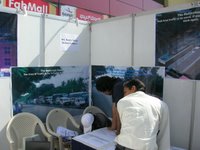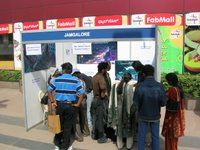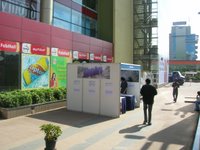Social Catharsis V : Jamgalore
 As citizens, we ought to do something to bring about a change. With this thought in mind, we, a group of volunteers, came up with a movement aimed at mitigating traffic problems within the existing infrastructure. We feel this can be accomplished by better traffic management and by better enforcement of the same. Thus was born - Jamgalore. Jamgalore is a campaign directed at alleviating traffic problems in the city by providing simple, easy-to-execute solutions.
As citizens, we ought to do something to bring about a change. With this thought in mind, we, a group of volunteers, came up with a movement aimed at mitigating traffic problems within the existing infrastructure. We feel this can be accomplished by better traffic management and by better enforcement of the same. Thus was born - Jamgalore. Jamgalore is a campaign directed at alleviating traffic problems in the city by providing simple, easy-to-execute solutions.“Jamgalore” is a pun signifying the Jams Galore in Bangalore and a corruption of the city’s name. It’s a movement to reach out to the voices-unheard, troubled, tortured, angry and annoyed, depressed and dejected.
Jamgalore’s mission is to sensitize the traffic authorities on the ground truths with respect to traffic problems and provide alternative solutions to manage traffic better. We planned to collect audiovisual evidence that highlights the problems and provide solutions for the same. In addition, we planned to collect signatures at a venue from concerned citizens. All these artefacts are to be handed over to the concerned authorities. A group of volunteers would follow up with the authorities on implementing the solutions. These artifacts, which include pictures and videos highlighting the scenario, help each one of us understand the seriousness of the situation and act on the same. We plan to organize this movement in phases, concentrating on a region at a time. All artifacts (pictures, videos, and so on) would be sent as a build-up to the event, to as many people as we can reach by e-mail.


Some Pictures depicting the Traffic Jam on the stretch from
the Central Silk Board to the Flyover at Jayadeva Institute of
Cardiology
The first phase of this campaign was kicked off on 11th December, 2005. We highlighted traffic problems on the stretch from the Central Silk Board (C.S.B) to the flyover near Jayadeva Cardiology Institute. We sent pictures, videos and presentations highlighting traffic issues over a period of 5 days by e-mail. Some of the pictures are shown here too. We received a good response from the recipients, with some of them volunteering and some others promising to be there at the venue. The signature campaign was held at The Forum Mall, Koramangala on 17th and 18th December, 2005.
 We printed around 7000 pamphlets to be distributed to citizens at the venue. A stall was set up at the venue to facilitate collection of signatures and to display the artifacts that we had collected about the traffic problems. In addition, we displayed 6 flexi-banners (each measuring 5’ X 3’) in the stall that depicted the traffic problems, in the form of actual photographs.
We printed around 7000 pamphlets to be distributed to citizens at the venue. A stall was set up at the venue to facilitate collection of signatures and to display the artifacts that we had collected about the traffic problems. In addition, we displayed 6 flexi-banners (each measuring 5’ X 3’) in the stall that depicted the traffic problems, in the form of actual photographs.The problems and corresponding solutions were displayed on the exterior of the stall and inside. We had signature sheets placed on the table. We also had music playing all day.
The pamphlets and banners were outsourced to print professionals. The stall was courtesy an event management group. It took us around an hour to set up the stall in entirety. We hoped it won’t rain as the stall didn’t have a roof-cover. If it rained, we had to pack up.
Four volunteers were present at the venue, answering people’s queries, guiding them to the stall and managing the signature sheets & the pamphlets. We set up a table 7’ away from the stall to distribute pamphlets. But, the authorities asked us not to distribute it outside the stall, only within it. Thereafter, we limited ourselves to the stall. Periodic security patrol was also prevalent near our stall. Once set, we were elated to see our dream in motion. At the same time, we were praying against any untoward incidents. People started coming in and slowly but surely, the scare turned into confidence.
 It was heartening to see the whole spectrum of people react the way it did. People would just pass by and look at the stall with curiosity. Some of them would be gracious enough to stop by and enquire about the whole campaign. As the day passed, the number of signatures gathered momentum. Some of them would probe deep into the solutions. One such person was an architect by profession and had studied town-planning. We had a very constructive discussion with him on each of the proposed solutions. He also proposed some solutions concerning the infrastructure which was beyond our capacity in terms of implementation.
It was heartening to see the whole spectrum of people react the way it did. People would just pass by and look at the stall with curiosity. Some of them would be gracious enough to stop by and enquire about the whole campaign. As the day passed, the number of signatures gathered momentum. Some of them would probe deep into the solutions. One such person was an architect by profession and had studied town-planning. We had a very constructive discussion with him on each of the proposed solutions. He also proposed some solutions concerning the infrastructure which was beyond our capacity in terms of implementation. People from all walks of life passed by the stall. Auto-rickshaw drivers nearby signed in as well. As the clock struck five, the crowd thickened. Signatures started pouring in. We were on our toes explaining the problems, solutions and getting people’s feedback, their suggestions and participation. It was magical. The people ranged from school-children, college students, professionals to retired citizens. Those who came spoke with one voice. Their frustration with traffic problems were channelized into signatures – Signatures for solutions to be implemented, signatures so that they need not be frustrated anymore, signatures to resurrect optimism in each one’s mind, signatures for a better tomorrow.
People from all walks of life passed by the stall. Auto-rickshaw drivers nearby signed in as well. As the clock struck five, the crowd thickened. Signatures started pouring in. We were on our toes explaining the problems, solutions and getting people’s feedback, their suggestions and participation. It was magical. The people ranged from school-children, college students, professionals to retired citizens. Those who came spoke with one voice. Their frustration with traffic problems were channelized into signatures – Signatures for solutions to be implemented, signatures so that they need not be frustrated anymore, signatures to resurrect optimism in each one’s mind, signatures for a better tomorrow.We were at the venue from 9 A.M. to 11 P.M on the first day. Each moment spent there was memorable, heartening, overwhelming and filled with pride. We asked the security in charge to take care of the stall till the next day.
 We could notice some clouds the next morning. Prayers began once again. We were at the venue at 9.00 A.M. The crowd was thin. It was a Sunday and we hoped it would increase soon. After a while, we saw a couple approaching us. In their 60s, they asked us what this was all about. They listened patiently as we talked. They provided us with their signatures. Thereafter, they stood there for around 45 min. and started talking about the present as it is. One could only sympathize with the senior citizens who have seen it all but still can’t do much about things around them. It was wonderful to hear their points-of-view as it gave us a picture in their mind, a picture that says “people do something about it before it’s too late”. We thanked them for helping us and being a part of this movement.
We could notice some clouds the next morning. Prayers began once again. We were at the venue at 9.00 A.M. The crowd was thin. It was a Sunday and we hoped it would increase soon. After a while, we saw a couple approaching us. In their 60s, they asked us what this was all about. They listened patiently as we talked. They provided us with their signatures. Thereafter, they stood there for around 45 min. and started talking about the present as it is. One could only sympathize with the senior citizens who have seen it all but still can’t do much about things around them. It was wonderful to hear their points-of-view as it gave us a picture in their mind, a picture that says “people do something about it before it’s too late”. We thanked them for helping us and being a part of this movement. Thanks to the public address system inside the mall, more and more people came in. But there were curious onlookers now and then. Some of the people who signed were kind enough to get their friends on board too. One of the signatories, who signed the previous day, did a great job by getting her contacts to come to the stall all through the day. We were overwhelmed by such a positive response. It was very touching. The campaign picked up pace in the evening. While a chunk of the crowd read the “problems and solutions” sheets pasted outside the stall, others provided signatures and some others provided constructive feedback. At that moment, guess all of us had the same feeling - People’s active participation is here, and here to stay.
Thanks to the public address system inside the mall, more and more people came in. But there were curious onlookers now and then. Some of the people who signed were kind enough to get their friends on board too. One of the signatories, who signed the previous day, did a great job by getting her contacts to come to the stall all through the day. We were overwhelmed by such a positive response. It was very touching. The campaign picked up pace in the evening. While a chunk of the crowd read the “problems and solutions” sheets pasted outside the stall, others provided signatures and some others provided constructive feedback. At that moment, guess all of us had the same feeling - People’s active participation is here, and here to stay.The most memorable moment of the whole campaign came at the end of it. We had just about packed up stuff when I saw a group of four guys stare at our stall. I told them it’s for traffic that they need not do anything out of the way. One guy looked at me, gave a smile and touched his right ear and lips and shook his hand. At that moment, there was a chill down my spine. I waved my hand and called them to the stall. My fingers pointed at the problems and solutions and they read all of it. I, then, directed them towards the banners that were put up, and that’s when they understood it was all about traffic jams. I took the signature sheet and showed them the same. Well, they read it and signed it. One of them smiled and said “ank u” in a very feeble, high-pitch tone. They all waved and gave a thumbs-up. I did the same. This experience will remain etched in my memory till I perish. After some time, we all packed up and called it a day.
We thank each one of you who have been a part of this phase of the movement. We need your support, encouragement and feedback to make this movement a success, to make this movement realize its goal, and to help each one make a difference.
Jamgalore is intended to be a movement by the people, for the people and of the people. To get in touch with us or to provide feedback on traffic problems anywhere in Bangalore (Be it solutions, pictures or videos highlighting the problem statement), mail us at
Jamgalore@gmail.com
We can We should We will!